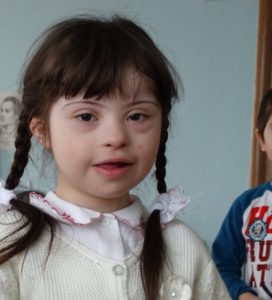 When you look at Ruxanda, you see two keen eyes, two braids, and a big smile. Every morning, she wakes up early, gets dressed, and goes to kindergarten, where she has many friends and spends the day playing with the other children and discovering the world.
When you look at Ruxanda, you see two keen eyes, two braids, and a big smile. Every morning, she wakes up early, gets dressed, and goes to kindergarten, where she has many friends and spends the day playing with the other children and discovering the world.
“She is very agile and moves a lot. She wants to explore things and write,” says Tatiana David, Ruxanda’s mother. “She’s no different than other children.”
Ruxanda has Down Syndrome, and although the children readily accepted her when she started attending school, the teachers knew little about educating children with disabilities. Through the project Piloting Inclusive Education in Pre-School Institutions implemented by Step by Step Moldova and Keystone Moldova in partnership with the Ministry of Education and the Republican Center for Psycho-Pedagogical Assistance, the teachers learned about social and educational inclusion and how to teach and support children with disabilities. Parents of other students also had the opportunity to learn about the benefits of inclusion for all students.
Today, the teachers and administrators at the school believe in the benefits of inclusive education. “I think Ruxanda has made great progress not only physically but also emotionally and socially, because she is among the other children,” says the principal.
She runs and plays with the other children, imitating them as she participates in all of the classroom activities. She may not do everything exactly the same way as other students, but she understands all of rules.
Because she’s included, she feels like any other child. Her classmates see her as one of their peers who will learn and grow alongside them at school and in the community.


 When you look at Ruxanda, you see two keen eyes, two braids, and a big smile. Every morning, she wakes up early, gets dressed, and goes to kindergarten, where she has many friends and spends the day playing with the other children and discovering the world.
When you look at Ruxanda, you see two keen eyes, two braids, and a big smile. Every morning, she wakes up early, gets dressed, and goes to kindergarten, where she has many friends and spends the day playing with the other children and discovering the world.